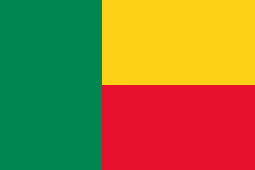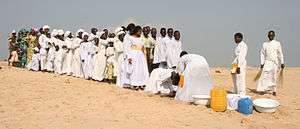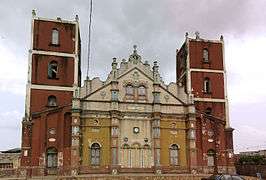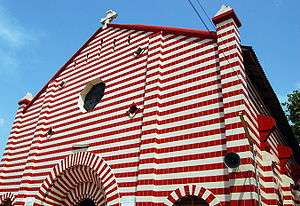Religion in Benin
Christianity is the most widely professed religion in Benin, with 48.5% of the nation's total population being members of various Christian denominations. Consequently, it plays an important role in shaping the country's social and cultural life.
| Part of a series on the |
| Culture of Benin |
|---|
 |
| History |
| People |
| Languages |
| Cuisine |
| Religion |
| Literature |
|
Music and performing arts |
|
Media |
| Sport |
|
Monuments
|
|
Symbols |
Religion in Benin (2013 census)[1]

According to the 2013 estimate by the government of Benin, the population of Benin is 27.7% Muslim, 25.5% Roman Catholic, 13.5% Protestant (which includes Celestial 6.7%, Methodist 3.4%, and other Protestant 3.4%), 11.6% Vodun, 9.5% of other Christian denominations, and 12.2% of others or none.[2]
There are Christians, Muslims, and adherents of African Traditional Religion throughout the country.[3] However, most adherents of the traditional Yoruba religious group are in the south, while other African Traditional Religion beliefs are followed in the north.[3] Muslims are represented most heavily in the north and southeast.[3] Christians are prevalent in the south, particularly in Cotonou, the economic capital.[3] It is not unusual for members of the same family to practice Christianity, Islam, African Traditional Religion, or a combination of all of these.[3]
Faiths
African Traditional Religion
Among the most practiced African Traditional Religions in Benin is the Vodun system of belief which originated in this area of Africa.[3]
Other African Traditional Religions are practiced in the Atakora (Atakora and Donga provinces) and Vodun and Orisha or Orisa veneration among the Yoruba and Tado peoples is prevalent in the center and south of the country. The town of Ouidah on the central coast is the spiritual center of Beninese Vodun.
The Tado and the Yoruba Orisha pantheons correspond closely:
- The supreme deity Mawu (in the Fon language) or Olodumare (also known as Olorun, Eledumare, Olofin-Orun and Eledaa among other names)(in Yoruba)
- The deity of the earth and smallpox, known as Sakpana (or Sopono, Sakpata), can also be spelt as 'Shakpata, Shopono, Shakpana, and also known as Babalu Aye or Obalu Aye.
- The deity of thunder and lightning, known as Shango; can also be spelt as Sango, also known as Jakuta, Chango, Xevioso and Hevioso.
- The deity of war and iron, known as Ogun, also known as Ogoun or Gu.
Christianity
Christianity first reached Benin in 1680, gaining more permanent footing in the 19th century. English Methodists arrived in 1843, operating amongst the coastal Gun people. More than half of all Christians in Benin are Roman Catholic.[3] The Catholic hierarchy in Benin consists of the Archdiocese of Cotonou (including the Dioceses of Abomey, Dassa-Zoumé, Lokossa, Porto Novo) and the Parakou (including the Dioceses of Djougou, Kandi, Natitingou, and N'Dali). There are 440 priests and 900 men and women in religious orders. Other Christian groups include Baptists, Methodists, Assemblies of God, Pentecostals, Seventh-day Adventists, the Church of Jesus Christ of Latter-day Saints (Mormons), Jehovah's Witnesses, Celestial Christians, Rosicrucians, the Unification Church.[3] Many nominal Christians also practice traditional local religious beliefs.[3]
Islam
Islam, which accounts for more than 27% of the country's population, was brought to Benin from the north by Hausa, and Songhai-Dendi traders. Nearly all Muslims adhere to the Sunni Maliki branch of Islam.[3] The few Shi'a Muslims are primarily Middle Eastern expatriates.[3] Ahmadiyya Muslim Community is also present, who recently inaugurated a mosque in Benin, the Al Mahdi Mosque in 2006. Many nominal Muslims also practice traditional local religious beliefs.[3]
 Mosque in Porto-Novo
Mosque in Porto-Novo Islamic art in Benin
Islamic art in Benin.jpg) Pilgrims leaving for Mecca
Pilgrims leaving for Mecca
Three out of twelve departments have a Muslim majority: Alibori (81.3%), Donga (77.9%) and Borgou (69.8%). [4] Couffo has the lowest share of Muslims in Benin as Muslims comprise less than 1% of the total population.
Freedom of religion
The Constitution of Benin provides for freedom of religion, and the government generally respects this right in practice.[3] The United States government recorded no reports of societal abuses or discrimination based on religious belief or practice during 2007, and prominent societal leaders have taken positive steps to promote religious freedom.[3]
References
- https://www.cia.gov/library/publications/the-world-factbook/geos/bn.html
- "The World Factbook — Central Intelligence Agency". www.cia.gov. Retrieved 2018-08-20.
- International Religious Freedom Report 2007: Benin. United States Bureau of Democracy, Human Rights and Labor (September 14, 2007). This article incorporates text from this source, which is in the public domain.
